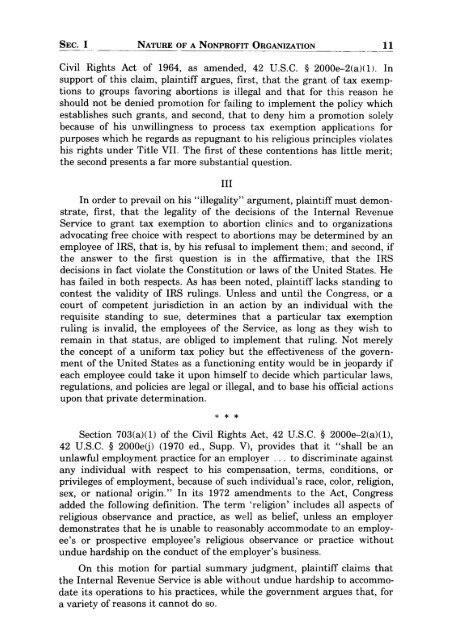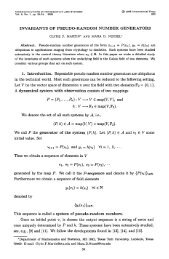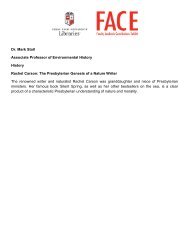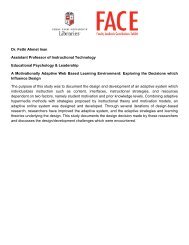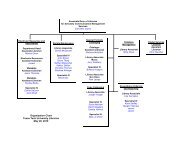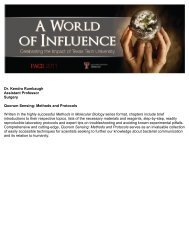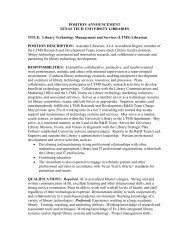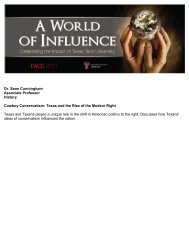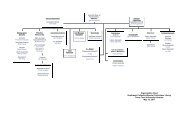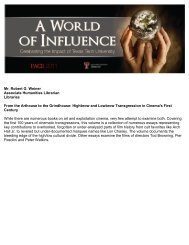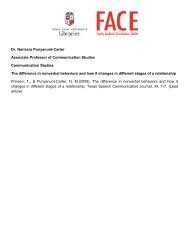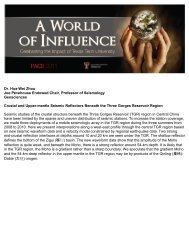Nonprofit Organizations Law and Policy Third Edition - Libraries ...
Nonprofit Organizations Law and Policy Third Edition - Libraries ...
Nonprofit Organizations Law and Policy Third Edition - Libraries ...
You also want an ePaper? Increase the reach of your titles
YUMPU automatically turns print PDFs into web optimized ePapers that Google loves.
SEC. I NATURE OF A NONPROFIT ORGANIZATION 11<br />
- - -_. _. - ------<br />
Civil Rights Act of 1964, as amended, 42 U.S.C. § 2000e-2(a)( 1). In<br />
support of this claim, plaintiff argues, first, that the grant of tax exemptions<br />
to groups favoring abortions is illegal <strong>and</strong> that for this reason he<br />
should not be denied promotion for failing to implement the policy which<br />
establishes such grants, <strong>and</strong> second, that to deny him a promotion solely<br />
because of his unwillingness to process tax exemption applications for<br />
purposes which he regards as repugnant to his religious principles violates<br />
his rights under Title VII. The first of these contentions has little merit;<br />
the second presents a far more substantial question.<br />
III<br />
In order to prevail on his "illegality" argument, plaintiff must demonstrate,<br />
first, that the legality of the decisions of the Internal Revenue<br />
Service to grant tax exemption to abortion clinics <strong>and</strong> to organizations<br />
advocating free choice with respect to abortions may be determined by an<br />
employee of IRS, that is, by his refusal to implement them; <strong>and</strong> second, if<br />
the answer to the first question is in the affirmative, that the IRS<br />
decisions in fact violate the Constitution or laws of the United States. He<br />
has failed in both respects. As has been noted, plaintiff lacks st<strong>and</strong>ing to<br />
contest the validity of IRS rulings. Unless <strong>and</strong> until the Congress, or a<br />
court of competent jurisdiction in an action by an individual with the<br />
requisite st<strong>and</strong>ing to sue, determines that a particular tax exemption<br />
ruling is invalid, the employees of the Service, as long as they wish to<br />
remain in that status, are obliged to implement that ruling. Not merely<br />
the concept of a uniform tax policy but the effectiveness of the government<br />
of the United States as a functioning entity would be in jeopardy if<br />
each employee could take it upon himself to decide which particular laws,<br />
regulations, <strong>and</strong> policies are legal or illegal, <strong>and</strong> to base his official actions<br />
upon that private determination.<br />
* * *<br />
Section 703(a)(1) of the Civil Rights Act, 42 U.S.C. § 2000e-2(a)(1),<br />
42 U.S.C. § 2000e(j) (1970 ed., Supp. V), provides that it "shall be an<br />
unlawful employment practice for an employer ... to discriminate against<br />
any individual with respect to his compensation, terms, conditions, or<br />
privileges of employment, because of such individual's race, color, religion,<br />
sex, or national origin." In its 1972 amendments to the Act, Congress<br />
added the following definition. The term 'religion' includes all aspects of<br />
religious observance <strong>and</strong> practice, as well as belief, unless an employer<br />
demonstrates that he is unable to reasonably accommodate to an employee's<br />
or prospective employee's religious observance or practice without<br />
undue hardship on the conduct of the employer's business.<br />
On this motion for partial summary judgment, plaintiff claims that<br />
the Internal Revenue Service is able without undue hardship to accommodate<br />
its operations to his practices, while the government argues that, for<br />
a variety of reasons it cannot do so.


